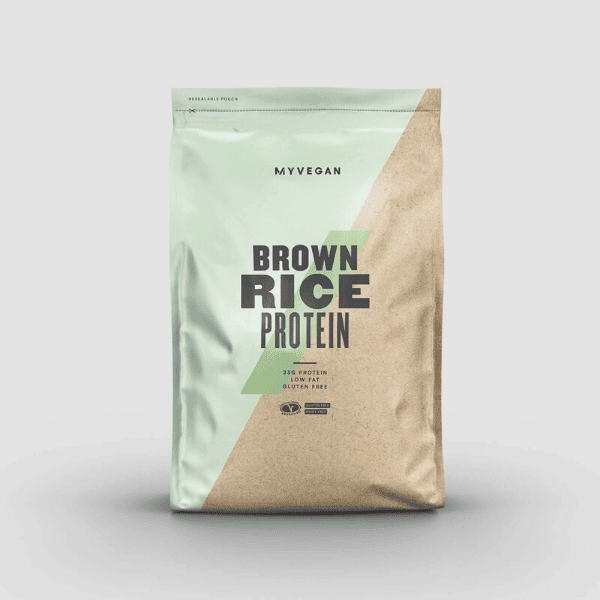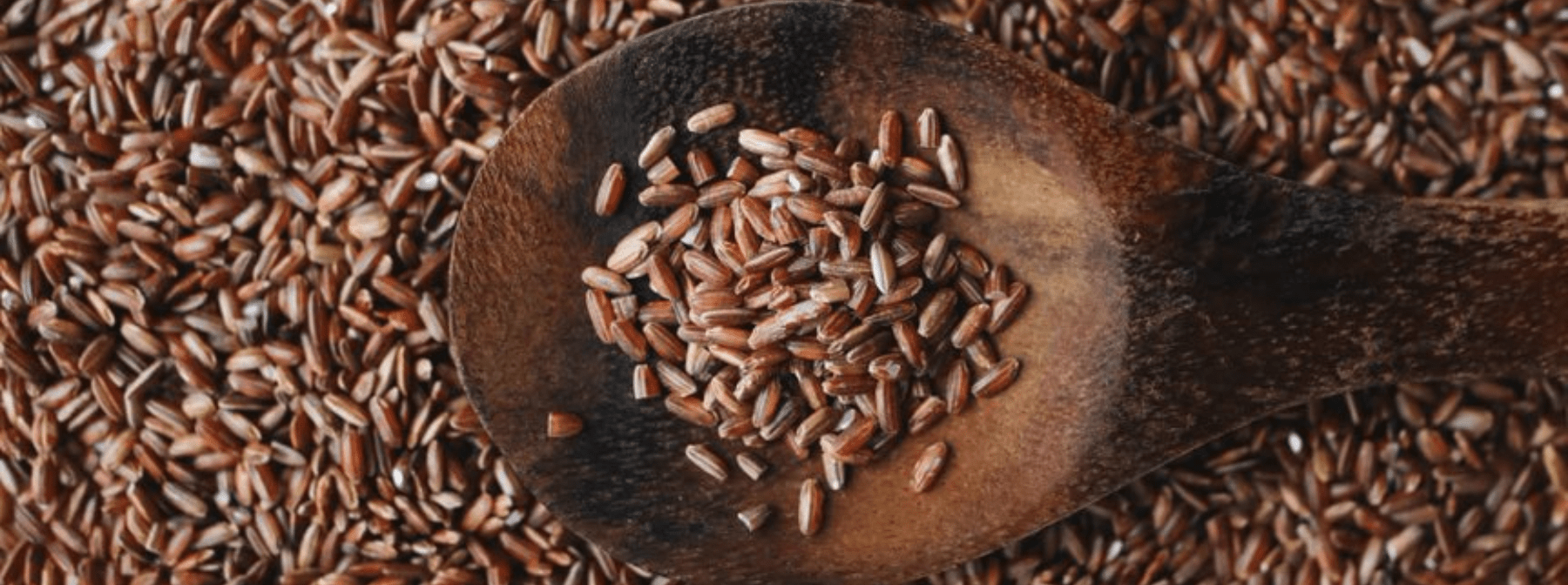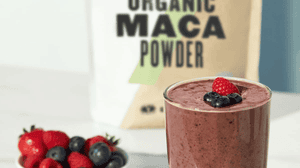
What Is Brown Rice Protein?
Brown rice protein, as its name suggests, is extracted from whole grain brown rice. Whole grain rice means that the rice contains both the bran and the germ; this is different to white rice, which is typically more refined, hence its paler colour.
During processing, the protein and carbohydrates in the brown rice are separated, and the protein is isolated to make the high protein powder.
How Much Protein Is In Brown Rice? Is it enough?
One serving of brown rice (around 185g cooked weight) contains 7.4g of protein. This can contribute towards your total protein goal within a meal.
For a complete balanced meal, it is recommended that all the food groups are included – protein, fats, and carbohydrates.
Benefits Of Brown Rice
It may help increase your fibre intake
Brown rice contains a higher fibre content in comparison to white rice. 95% of adults struggle to meet the recommended daily fibre intake of 30g per day. Swapping from white to brown rice is one easy swap to help get you closer to this goal
Brown rice may sustain your energy levels
Brown rice is a lower GI food, which means it is less likely to cause blood sugar spikes. This is also means that the post-meal crash is less likely as well. Including brown rice as your carbohydrate may help to keep you feeling fuller for longer and sustain those energy levels throughout the day.
It may support your gut health
Brown rice may help to improve gut health via two mechanisms. Firstly, the high fibre content helps to feed the ‘good’ bacteria that live in our gut. Secondly, the short chain fatty acids found in brown rice help to maintain the gut wall. This is important to prevent leakage and wastage of valuable nutrients that travel through the gut.
What Is Brown Rice Protein Powder?
Myvegan Brown Rice Protein contains 23g of protein per 30g scoop. For post-workout recovery support, it is recommended to have an extra 15-25g post-workout; whether you are trying to generally increase protein intake or if you need extra support post-workout, Myvegan brown rice protein will help support this goal.
It is important to note that brown rice protein is an incomplete protein – this means that is does not contain all the essential amino acids required. It is suggested to pair brown rice protein with another protein source to make a complete protein source.
Benefits Of Brown Rice Protein
May support cognitive function
Brown rice protein is high in glutamic acid: glutamic acid is an amino acid which is an essential building block for protein. Whilst this is a non-essential amino acid (meaning it can be synthesised in the body), it is integral for neurotransmitter function. Glutamic acid supplementation may help to improve nerve function and support cognitive function. (2)
May help build up lean muscle
Brown rice protein is high in arginine: arginine is another non-essential amino acid that is used as a building block for proteins. Arginine is also important for hormone balance, as it helps to promote luteinising hormone – a hormone responsible for the production of testosterone (important for both men and women). Arginine supplementation has been linked with lower body fat mass, and a higher proportion of lean muscle mass. (3)
May help increase your protein intake
Brown rice protein helps to build muscle: multiple studies have shown that supplementation with high doses of brown rice protein are just as effective when it comes to muscle repair and strength building when compared to supplementation with whey protein powders. If you are new to protein supplementation, brown rice protein, or any other plant-based proteins are a great place to start and should help you to increase overall protein intake.
It's more allergen-friendly
Brown rice protein is one of the most allergen friendly proteins: the prevalence of food allergies is on the rise, with the three biggest culprits being shellfish, milk, and peanuts. Soy and wheat are also on the list, which can be difficult when choosing a protein powder. However, rice protein allergy is relatively rare, so brown rice protein is usually considered a safe choice for the majority of people.
It can be used in many ways
Brown rice protein is naturally versatile: Myvegan brown rice protein is unflavoured so can be used in a whole variety of ways, from baking to protein shakes. It also means it can be mixed with other proteins without overpowering any other flavours – ideal for building a complete protein profile.
Pair Up These Foods With Brown Rice Protein
Some of the best foods to pair with brown rice protein to build a complete protein include: • Pea protein powder • Soy protein powder • Peanut butter • Spirulina powder • Hemp seeds
Talk To A Nutritionist
This article is for educational purposes only and not to be used as a substitute for medical advice. If you have concerns about your health, please contact your GP or other healthcare professional.
Take Home Message
In conclusion, brown rice protein has a whole host of benefits including high protein, fibre and nutrient content. It is recommended to pair brown rice protein with another of your favourite protein sources in order to obtain a complete amino acid profile.

FAQs
Can we eat brown rice daily?
Absolutely! Brown rice is a great source of nutrients, especially fibre. If you find that the fibre content is causing bloating, then mix it with a white rice to aid with digestion.
Is brown rice higher in protein than white rice?
Brown rice contains on average, 4g of protein per 100g. This makes it slightly higher in protein than white rice, which contains approximately 3g protein per 100g.
How much protein is in a bowl of brown rice?
One serving of brown rice (around 185g cooked weight) contains approximately 7.4g of protein.
How much protein do I need in a day?
It is recommended that the average person requires 0.8-1.2kg protein per kg of body weight. However, protein needs increase in those that participate in strength or endurance sports, with a range of 1.2-2g of protein per kg of body weight.
Is brown rice protein good for you?
Protein is essential for supporting muscle repair and growth. Brown rice protein is high in protein content, and also has a range of other benefits.
Is brown rice protein a complete protein?
Brown rice protein is not a complete protein – we recommend combining brown rice protein with another of your favourite protein powders for maximum impact.
Is brown rice protein the same as brown rice?
Brown rice protein is extracted from whole grain brown rice. The wholegrain undergoes processing to separate the protein and carbohydrates to create a high protein supplement.
Can brown rice protein build muscle?
Evidence suggests that supplementation with brown rice protein can have a positive impact on muscle growth. Furthermore, there is no difference between brown rice protein and whey protein and their effects on muscle gain.
Is brown rice protein powder easy to digest?
Some of the fibre is removed during processing, which makes brown rice protein easier to digest than brown rice itself. It is a commonly used protein powder in many plant-based snack bars and generally considered to be easily digested.
British Dietetic Association. Wholegrains: food fact sheet. [online]. BDA; 2022. Available from: https://www.bda.uk.com/resource/wholegrains.html [Accessed 20th Oct 2022]
Joy J, Lowery R, Wilson J, Purpura M, De Souza E, Wilson S et al. The effects of 8 weeks of why or rice protein supplementation on body composition and exercise performance. Nutr J. 2013; 12: 86
https://www.ncbi.nlm.nih.gov/pmc/articles/PMC3698202/
Mneal C, Meininger C, Reddy D, Wilborn C, Wu G. Safety and effectiveness of arginine in adults. J. Nutr. 2016; 146(12): 2578S-2593S
https://academic.oup.com/jn/article/146/12/2587S/4589981
Food Allergy Research and Education. The food allergy epidemic. [online]. FARE. 2022. Available from: https://www.foodallergy.org/resources/facts-and-statistics [Accessed 20th Oct 2022]
British Dietetic Association. Sport and exercise: food fact sheet. [online]. BDA, 2020. Available from: https://www.bda.uk.com/resource/sport-exercise-nutrition.html
[Accessed 20th Oct 2022].









